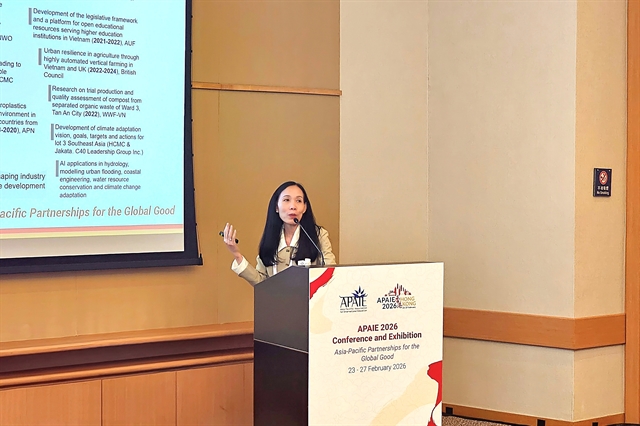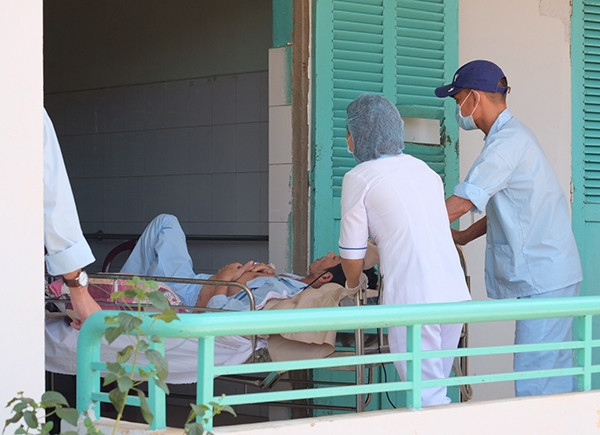 Society
Society

 |
| Medical workers take care of HIV/AIDS patients at Nhân Ái Hospital. — Photo khoahocphothong.vn |
BÌNH PHƯỚC — The Nhân Ái (Humane) Hospital is the biggest HIV/AIDS hospital in Việt Nam which provides free treatment for end-stage HIV/AIDS patients and people from drug rehabilitation centres in HCM City.
It is located in Phú Văn Commune, Bù Gia Mập District in Bình Phước Province, about 200km from HCM City’s centre.
The hospital was established in 2006 on an area of 170ha. It has 363 medical workers and 595 patients.
At 8.30am, hundreds of patients from treatment rooms gathered from all over the hospital’s campus.
Strong patients clean rooms and hallways and take care of plants, while weaker ones bask in the sun or chat happily.
Walking around different rooms, doctor Lê Văn Hạng, Deputy Head of the General Planning Division, thoughtfully asked every patient about his health condition.
Seeing Hạng from afar, patient N.A.T, 57, from Hà Nội, said hello joyfully.
T. has been at the hospital for more than seven years, never once returning home.
Previously, T. was a long-distance car driver.
In 2016, he fell off his motorbike and was paralysed, and at that time he learned he was infected with HIV.
"Receiving the results, I was shocked because I had no symptoms at all. At that time, I went from nearly 60kg to only 37kg," said T.
"When I first entered the hospital, I had to lie still. Many times I was depressed and did not want to live anymore. Doctors and nurses persevered in daily physical therapy for me and aroused my desire to live. Now I can use a wheelchair on my own, my gradual recovery is considered a miracle. Medical workers here are more than relatives, taking care of me on behalf of my family. I am very grateful to them,” he said.
Similar to T., K.D, 50, from HCM City, has been treated for HIV in the hospital for nine years.
D. said that the day she learned that she had contracted HIV from injecting drugs, she collapsed.
"After my friends introduced, I voluntarily went to the hospital. At that time, I couldn't walk on my own and thought I was close to death. But coming here, I’m loved, cared for and treated enthusiastically. I take medicine regularly, so now I'm healthy. I've gained 10kg, and everyone who sees me compliments me on my beautiful skin," said D.
D. added that she was used to living in the Nhân Ái Hospital so she didn't want to go home.
From time to time, she asked the hospital for permission to visit her family for one or two days and then come back.
"Seeing that I am healthy, my parents and children feel secure. I feel at home here. Tết here is very fun with many joyful activities," said D.
In the treatment rooms, nurses take turns caring for patients with severe body ulcers and unable to move on their own.
While changing the diaper of an emaciated male patient with ulcers all over his body, nurse Trần Thị Diệu softly asked: "Do you feel comfortable?"
She gently put on the patient's coat and carried him into the wheelchair while instructing: "Please sit patiently until the wound dries!"
In the next room, nurse Lê Thanh Phong gently found a vein and administered medicine to a 60-year-old male patient.
Due to his thin body and having formerly injected drugs, it was difficult to find a vein, so Phong had to be very skilful.
This is also the time when nurses have direct contact with the patient's fresh blood. Just a small mistake during injection, infusion, scratched hands or punctured gloves pose a high risk of infection.
Having worked here since the hospital's foundation, Bùi Văn Tiến, Deputy Head of Social Work Division, has met thousands of patients with severe exhaustion and weakened immune systems.
Tiến said that patients were mainly drug addicts and homeless people. In addition to HIV, they also had many other diseases such as tuberculosis, lung and liver disease.
Initially, when they first came to the hospital, they were often uncooperative, aggressive and even attack their caregivers.
"Every person has two sides, good and evil. When entering the Nhân Ái Hospital, patients receive care and attention, their good side develops, whereas the evil side is softened, said Tiến.
“Over the years of treating them, I always feel that they are more pitiable than blameworthy. Many of them are very emotional," he said.
Like the patients, the medical staff consider the hospital to be their family, their second home.
The most heartwarming joy and happiness for them are the patient's health and smiles.
Many patients came here with their health exhausted, but with their own efforts day by day and the wholehearted care of the medical workers, they regain their health like they are reborn. — VNS




